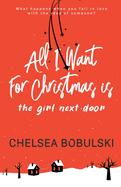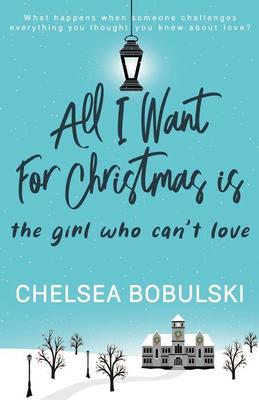







By Melissa Warner Published March 13, 2022
For Chelsea Bobulski, young adult (YA) fiction “encapsulates the teenage experience.” In her writing, she seeks to explore the time in life when a person is discovering who they are while being pressured by others (even those well intentioned) telling them who to be. “There is nothing like being a teen” Ms. Bobulski said. It is a “microcosm” where everything feels so important and others’ opinions matter so much. At the same time, you have everyone telling you who to be, you have to make decisions, and you have to find yourself and your way through that.
Indeed, each of the couples in her newest books struggles with finding themselves and finding each other. The book titles all begin with All I Want for Christmas is…, and then continue: #1 …the Girl Next Door, #2 …the Girl in Charge, #3 …the Boy I Can’t Have, and #4 …the Girl Who Can’t Love. The narrative structure of each of the four varies, and is related to how the stories came to her. In …the Girl Next Door, Graham time travels and his “story came fully formed in my head.” Beckett and Evelyn alternate narrating their story in the Girl in Charge because “when I sat down [to write], they started talking.” …the Boy I Can’t Have is a more typical linear story from Isla’s point of view and because she “questions herself the whole time,” August is more silent in the narration. In the final book, …the Girl Who Can’t Love. Ms. Bobulski was “playing” and got to use her college history degree as college students Savannah and Jordan solve a Revolutionary War time romance mystery. She has no favorite book, but she “wanted Beckett especially to have a happily ever after” because his past was very difficult.
The main characters in her earlier novels The Wood (2017) and Remember Me (2019) have mature attitudes, responsibilities, and actions. When asked if this was realistic, Ms. Bobulski said she thinks that teens can get a bad rap, and are not respected the way they should be in terms of how deep they are or the decisions they can make. “People think of teens as vapid and self interested, but they are constantly proving they are more interested in the world and making it better and all the people around them better.”
Interestingly, this YA author did not discover YA until later in life. In her hometown, there was a library and a KMart which only carried adult books. If there was a YA section in her library, she somehow missed it. While she read Harry Potter, she essentially skipped from the Sweet Valley High books to adult fiction. Not until college did she discover YA when a roommate was reading Twilight, and she was initially intrigued by the cover. Quickly tearing through that series and then the Hunger Games, she was hooked and “I realized it was what I loved.”
What makes YA fiction YA? According to Ms. Bobulski, one easy clue is the age of the protagonist. YA generally has protagonists aged 14 to 18. While some adult fiction has younger protagonists, the characters in YA are “in that high school experience.” The content of YA differs from other fiction too. Content for ages 9 to 12 tends to be external – kids learning about the world and how to connect to it, whereas YA is more internal – looking at who one is in relation to the world. Adult fiction deals with some of the same situations or issues as YA, but from a different perspective. She gave the example of the character being the adult divorcing versus being the teen child of a couple divorcing. According to Ms. Bobulski, YA is also beginning to push how dark its themes are, but it has a consistent thread of trying to understand who you are versus who people want you to be. Laughing, she pointed out that more and more adults are reading YA because they, too, are struggling to find themselves regardless of age or length in a career. “We never grow out of wondering is this [job] what I should be doing, would something else make me happier?”
Ms. Bobulski considered whether or not a reader might approach reading a YA book differently than other books. “It depends on the reader” and she can see it both ways. Arguing against it, she said she just reads a story to enjoy the story. “A good book invites you in, and you experience it the way the character experiences it.” But arguing for approaching a YA book differently, she recalls one reader who felt frustrated by the choices the young people were making in Remember Me. Ms. Bobulski thinks she unconsciously “reverts” to a younger person while reading some books, and gives “space in [her] brain” to be okay with the character making decisions differently than she would now, with the luxury of the vantage point of experience and greater self confidence.
Speaking of self confidence, she now knows as an adult, but did not know as a teen, the value of self confidence. As a teen, everything in that moment is important, and teens do not realize that is how they are thinking – they do not realize that until later in life when one can look back. She would advise her younger self to care less about what other people think, be comfortable in your own skin, and be comfortable in your own abilities. The key is to not put your personal value in what others think. Had she known this, she would have enjoyed high school so much more (although she met her husband in high school and they have been together since).
Having been afflicted by “doubt monsters” in the past, Ms. Bobulski shared some of her experiences in getting published with her first two novels. When asked why she believes her work has been published while others have not been, she discussed the many “gatekeepers” involved in traditional publishing. These range from an agent (who “needs to believe in your work and want to represent you…and picks you as much as you pick them”) to the editor (who “even though they love the book, has to convince the acquisition department,” unanimously as she has heard, “that your book is worth their investment”). Since so much of getting published is about the market rather than the writing, she believes more authors are choosing self publication. While this can be good for an author whose work is not being published for market reasons, it can be detrimental to authors whose work is not really ready. Discernment is critical for an author – am I being rejected because of the market or because I am not ready? No writer is perfect when they start, although most are innately good at some things. Her favorite example is The Help which was rejected 60 times in five years, yet was a wildly popular and successful book.
After her own rejection – five books in five years, being told her writing was not good enough, struggling to discern guidance from misunderstanding, experiencing doubt in herself, and doubting her storytelling ability, she has found something internally more important to her and that is her faith. Her faith makes her grounded and gives her a sense of purpose. She realized that “if my entire sense of purpose was in getting published, then my happiness was dictated by whether or not it happened; it was based on other people.” And “if that was still my belief, the ‘Oh, if I don’t get another book published by this time [mentality],’ then I could easily slide back into the depression.”
Yet, she has an “all-consuming need in [her] soul to put words on the page.” During the time of the “doubt monsters” and uncertainty if she should be writing, she tried to quit. She tried getting her “life back on track,” researching law schools. But Winter, main character in The Wood, kept “telling me her story and wouldn’t shut up.” Continuing her law school research, Ms. Bobulski decided to just write what Winter was saying to silence the character’s voice. After the first 50 pages, much of which is unchanged in the final published version, Ms. Bobulski realized that there was going to be a book, and she could not stop writing. She finished and sent out The Wood, and had few expectations that anything would happen. On the day she received notice The Wood would be published, she went to Costco with her husband and could not stop jumping up and down in excitement. She is sure other shoppers thought something was not quite right about her! However, it was affirmation that she is supposed to be writing. With six published books now, and having a daily centering Bible study time, the “doubt monsters” are much better; she has many fewer “should” worries.
Now “taking a breather” after the four Christmas books’ publication in just 13 weeks (!), she is “slowly sinking in” to her next book. Her publishing experience was very different with the four. The first had been submitted with no plans for it to be in a series, and Ms. Bobulski was asked if she wanted to do a series. She gave several ideas, but did not expect them all to be published. She feels the publisher recognized that some want to “binge watch TV and binge read a series,” and she was drawn to the idea. This all happened during Covid, with a change in her mother-in-law’s job that “gave me the opportunity to write a lot.”
As a child, Ms. Bobulski enjoyed anything involving storytelling such as dance and movies. For a time she wanted to be a zoologist, and later an archaeologist (having seen The Mummy). By her teen years, she was looking at being a teacher or lawyer (having seen Legally Blonde and reading LSAT books in the sixth grade), but was especially interested in being a teacher to have the summer months for writing. In addition to “going to school, doing my work and napping when I could,” her high school activities included community theater and mentoring a freshman while a senior.
Now as a writer, she believes a common misconception of writers is that people think, “oh, that’s cute you wrote a book, where’s your cardboard box,” or “where’s your mansion?” “Most writers can’t quit their day jobs.” Yet, she considers neither fame, nor herself famous, at least not until something happens like when a reader contacting her and telling her how much The Wood meant to the reader while she was going through a time of grief. Ms.Bobulski’s own, self-confessed misconception is that her work is not important or of much worth. For example, at times, she feels her creative gift has lesser value than the healing gift of a doctor. Ms. Bobulski loves the connection to people, and moments like the reader above confirm she is doing what she was intended to be doing and that her gift is important. Her family is also very supportive.
Back in 2020, looking for a little “balance” and lightness after her darker books The Wood (compared to Sleepy Hollow tv show which she has never seen) and Remember Me (think “Titanic meets The Shining”), Ms. Bobulski finished a Christmas romance comedy (“think It’s a Wonderful Life meets Disney Channel’s Wish Upon a Star”) that turned into All I Want for Christmas is the Girl Next Door. With no specific plans, she does has some thoughts about future Christmas books that could include seeing how the main characters are doing as they get older. Many readers have pleaded for a sequel to The Wood. If, at the end of her contract for The Wood, the book reverts back to her, she has thoughts to have one published, even if it is self published. She also has ideas for a book for kids aged 9 to 12, as well as some adult fiction ideas, and would eventually like to have books in every age group. So far, her books have all involved romance, although the degree of centrality varies. At the end of the day, she loves “a happy ending” (think Princess Bride or First Knight), but YA is her “first love.”